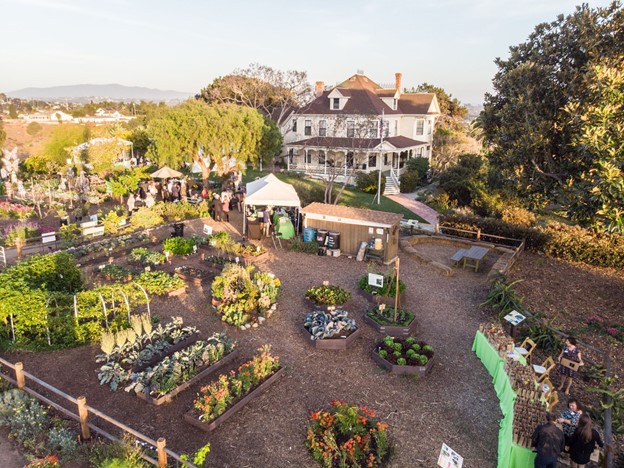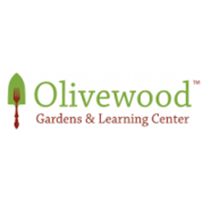Apply now to join our next cohort of Community Science Fellows and Community Leads!

An aerial view of Olivewood Gardens and Learning Center located in National City, CA.
Recognizing the strength of the community leaders in National City, this project will cultivate community involvement in composting efforts by empowering community leaders as the true outreach experts. Participation in green initiatives can be priorities in communities like National City and not reserved just for wealthy communities.
National City, California, is a city within the South Bay Region of San Diego County just 13 miles from the U.S.-Mexico border. National City is home to a dense population of more than 61,000 residents situated in more than 16,000 households within 7.28 square miles. National City is a predominantly Latinx city with a strong Filipino representation as well. According to 2019 Census tract information, about 40% of the city’s residents identify as being born outside of the U.S.. The residents of National City cope with enduring health concerns, including diabetes often attributed to limited access to affordable and healthy food.
Olivewood Gardens and Learning Center, the community partner for this project, has been actively involved in improving the health outcomes of National City residents through its interactive, indoor-outdoor classrooms with programming for children and adults alike. Through its community-based advocacy and education programs, Olivewood Gardens has helped National City residents connect to the food system and reach a thorough understanding of how their families’ nutrition connects to their agency and self-determination. Graduates of their Cooking for Salud program refer to themselves proudly as Kitchenistas. Kitchenistas are viewed as activated community leaders who fulfill a blend of roles as culturally relevant educators, outreach experts, and trusted connectors between the community and resources like those available at Olivewood Gardens and within the broader National City community.
With the roll out of new composting mandates expected for National City, this project recognizes that traditional ways of reaching community participation (e.g., advertising, printed flyers, directives) might not be sufficient to encourage the community to participate in new composting mandates. Kitchenista community leaders are well-poised to inform the design and structure of a culturally responsive and relevant pilot program that can reach the community and make connections between the food system, environmental justice, and other social concerns in ways that reinforce the importance of an intersectional approach.
The main goal behind this community science project is to increase community participation and an authentic understanding behind food scrap composting as it connects to environmental justice and other social concerns in the community.
The project involves the Kitchenista community leaders as its key stakeholders. With their training, lived experiences, and knowledge of the community, Kitchenistas are positioned to co-create a pilot program that can appropriately reach the wider National City audience.
The project will bring together a focus group of Kitchenistas to—alongside the project team—co-design and outline the topics and structure of the curriculum that will inform the pilot program. A great emphasis will be placed on infusing culturally relevant science communication into how these topics will be explored and the hands-on activities that will be brought to the broader National City community.
Outputs include:
The outputs of this project can positively impact the community by setting in motion the pilot program designed by the community, for the community. Since the curriculum will be drafted in collaboration with community leaders—those most well-versed in the realities of the broader community—we believe that it will yield strong messaging through its culturally relevant science communication, intersectional understanding, and hands-on activities. The greatest impact we can anticipate is greater participation and investment from the community in composting mandates that will reach National City in the immediate future. Additionally, this community project can provide promising practices and lessons learned with other cities that share similarities with National City.
Work will begin as soon as possible (May/June 2021). The exact length of the project will be determined by the needs of the community in partnership with community scientist, though we anticipate a 6–9 month duration.
Within the 6–9 month timeframe, we anticipate being able to:
Angelica Gastelum
Angelica was born in Tijuana, Mexico, and immigrated to the U.S. as a young child. She continues to be bilingual and binational as she commutes to visit family in Mexico. Her ties to the South Bay are strong as she completed her college education at San Diego State University. Go AZTECS!
Although her major was business administration, she has grown to love and appreciate the environment while working at Olivewood Gardens and Learning Center. As a lifelong learner, she continues to grow in her involvement with her community in both environmental stewardship and nutrition. She loves the outreach work with the school community and seeing students develop a love for nature and learning about where their food comes from.
Yanet Lopez
Yanet Lopez is currently the Community Engagement Manager at the Fleet Science Center located in San Diego, California. The Fleet Science Center’s mission is to realize a San Diego where everyone is connected to the possibilities and power of science to create a better future. In her current capacity, she is involved in supporting the neighborhoods of Barrio Logan, National City, Southeast San Diego, and San Ysidro to help residents reach their STEM aspirations.
Yanet has more than 8 years of experience in federal grant management, previously working on TRIO grant projects at California State University, Northridge, and in community-based nonprofit organizations supporting students and their families to reach their postsecondary goals. More recently, Yanet has experience of building authentic community engagement and partnerships through her work in the Barrio Logan community in San Diego. Yanet’s life experiences inform her work as she was born in Mexico but raised in San Diego and considers her bilingual/bicultural identity to help build bridges between theory and praxis.
Desired Skills and Expertise
Thriving Earth Exchange asks all scientific partners to work with the community to help define a project with concrete local impact to which they can contribute as pro-bono volunteers and collaborators. This work can also position the scientists and communities to seek additional funding, together, for the next stage.
Olivewood Gardens and Learning Center


(c) 2024 Thriving Earth Exchange